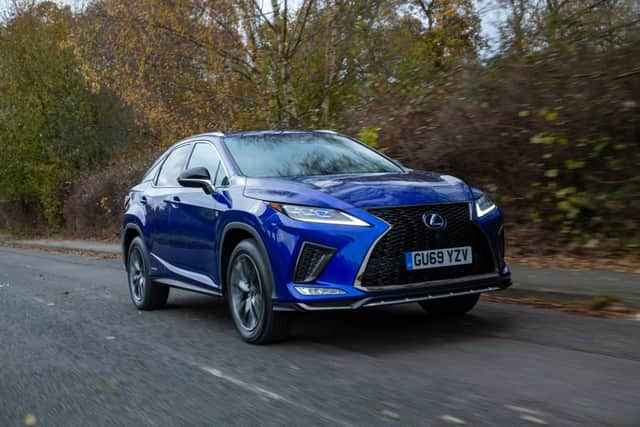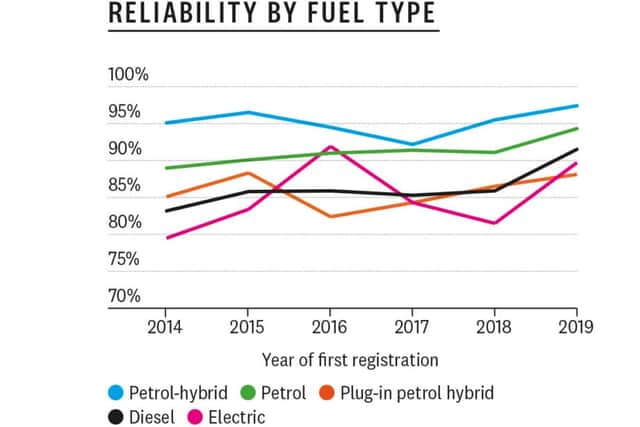Hybrid cars are more reliable than petrol or diesel


Hybrid cars are more reliable than their petrol, diesel or electric equivalents, according to new data.
A survey by Which? found that owners of "full hybrid" petrol-electric cars had experienced the fewest mechanical problems over the previous 12 months.
Advertisement
Hide AdAdvertisement
Hide AdThe consumer group gathered individual data on more than 55,000 vehicles from owners to compare reliability between petrol, diesel, full hybrid, plug-in hybrid and pure-electric cars.
It found that less than three per cent of full hybrid owners had needed to seek mechanical assistance for their car in the last year. That compares with six per cent of petrol car owners and 10 per cent of both diesel and EV owners. Plug-in hybrids proved least reliable but still less than 15 per cent of drivers suffered a problem with their car.


Hybrids are becoming increasingly popular with car makers and buyers as they look for ways to improve fuel economy and lower CO2 emissions as diesel falls out of favour. From superminis like the Honda Jazz and family hatchbacks like the Toyota Corolla to SUVs like the Volvo XC60, there are hybrids in virtually every segment.
With two (or more) motors and lots of additional electronics it might seem likely that they’ll also pack in more problems. However the Which? study suggests that's not the case.
Why are hybrids more reliable?
Advertisement
Hide AdAdvertisement
Hide AdDespite the apparent extra complexity of a hybrid drivetrain, Which?’s experts have suggested the differences to a petrol or diesel system could actually make them more resistant to failure.
Hybrids generally use a CVT transmission which doesn’t have a clutch and never disengages so is more resistant to wear.
The electric motor also has few moving parts and assists the petrol in heavy-demand situations, meaning the engine doesn’t have to work as hard, which can increase longevity.
The truly complicated part of hybrid systems are the power inverter (a non-moving part) and the software that controls it all.
Advertisement
Hide AdAdvertisement
Hide AdHarry Rose, Editor of Which? Magazine, commented: “It’s great to see so few people reporting issues with their petrol-electric hybrid car. Despite the complexities of two motors working in harmony, they are mechanically simpler than conventional petrol or diesel cars, which is good news for motorists as it reduces the likelihood of problems.
"While our research shows electric cars and plug-in hybrids are still less dependable than other fuel types, we expect to see their reliability improve as these markets establish themselves. Thanks to more challenging CO2 regulations, we're seeing more choice and in the future, we will have a lot more models to report on."
What are the different types of hybrid?


There are three main types of hybrid - mild hybrid (MHEV), full hybrid and plug-in hybrid (PHEV).
Mild hybrids, such as the Fiat Panda hybrid, use an integrated starter motor/generator and small battery. They can’t operate independently of the engine but offer a small boost in torque under acceleration or can allow the engine to cut out when coasting.
Advertisement
Hide AdAdvertisement
Hide AdFull hybrids, such as the Toyota Prius or Lexus RX, are also sometimes known as self-charging hybrids. They feature a larger battery and more powerful electric motor that is capable of powering the car on its own. It can be used to drive the car, particularly around town or to give assistance to the engine when it is at its least efficient, such as when setting off. Their batteries are charged via energy recuperation from braking/decelerating and via the combustion engine in low-load situations.
Plug-in hybrids like the Vauxhall Grandland X or Mitsubishi Outlander are similar to full hybrids but have larger batteries that can be charged via the same methods or by plugging them into a home or public charging point (the same chargers as used by EVs). Their larger batteries allow most PHEVs to cover between 20 and 40 miles on electric power per charge. Once the battery is depleted, they work in the same way as a full hybrid.
A version of this article first appeared on The Scotsman